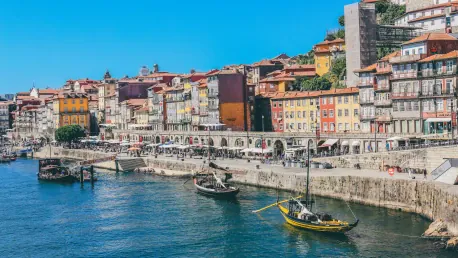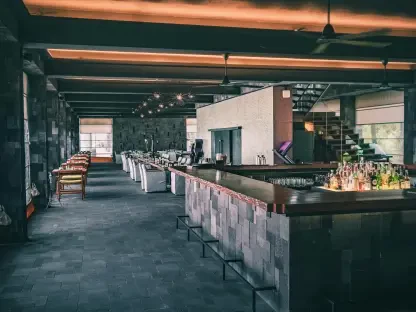The historic city of Beja, Portugal, is opening a new chapter in its storied past with the introduction of a state-of-the-art Holiday Inn hotel. Scheduled to officially open its doors in August 2024, the hotel blends modern hospitality with a rich infusion of local cultural and artistic elements. One of the major highlights is its stunning facade featuring murals of renowned Portuguese poets, created by the acclaimed artist Vhils. This move aims to attract more visitors and position Beja as a cultural hotbed in the Alentejo region. The innovative project symbolizes a broader trend where traditional hospitality is merged with cultural and artistic components to create an enriched tourism experience.
A Significant Investment in Beja’s Future
The opening of the Holiday Inn represents a substantial financial commitment to the city of Beja. With an investment of around 17 million euros, the project is expected to bring not just contemporary lodging facilities but also significant economic benefits to the locality. The hotel will offer 95 modern rooms, each outfitted with state-of-the-art amenities designed to provide the utmost comfort to visitors. This substantial investment marks a strategic move to stimulate local economic growth, encouraging more tourism and business activities in the area.
The economic implications of this project are far-reaching. Besides the immediate employment opportunities it creates, the influx of tourists is expected to boost local businesses, from restaurants to shops. This financial infusion will aid in uplifting the local economy and, more importantly, help put Beja on the tourism map in Portugal. The intent is to create a ripple effect, inspiring further investments in the region’s tourism infrastructure and thereby facilitating sustained economic growth.
The Intersection of Art and Hospitality
What sets this Holiday Inn apart from others is its impressive artistic facade. Created by the illustrious artist Vhils, the hotel features murals of prominent Portuguese literary figures, including Florbela Espanca and Mário Beirão. These artistic elements aim to enhance the cultural appeal of the city, making the hotel not just a place to stay but a cultural attraction in itself. By integrating art within the hotel’s design, the project aspires to create a visually stimulating environment that draws visitors for more than just its accommodations.
The choice of Vhils as the contributing artist further cements the project’s goal of marrying art with hospitality. Known for his transformative urban art, Vhils’ murals bring a touch of modernity while celebrating the rich literary history of Portugal. This unique combination is designed to attract art lovers, literature enthusiasts, and general tourists alike, thereby boosting Beja’s appeal as a multifaceted travel destination. Through this artistic integration, the Holiday Inn serves as a bridge connecting guests to the cultural and historical essence of Beja.
Elevating Beja’s Cultural Landscape
The introduction of this hotel aims to serve as a catalyst for the transformation of Beja into a cultural hub. Historically, Beja has been an under-the-radar destination, often overshadowed by more prominent Portuguese cities like Lisbon and Porto. The strategic placement of the hotel, adorned with murals that honor local poets, aims to elevate Beja’s cultural status. This cultural transformation anticipates attracting not just tourists but also cultural scholars and enthusiasts who are keen to explore the artistic richness of lesser-known locales.
By investing in the cultural landscape, the hotel does more than provide luxurious accommodations; it promotes local heritage and artistic expression. Tourist attractions will likely extend beyond the hotel’s boundaries, inviting visitors to explore Beja’s other cultural and historical landmarks. This holistic approach to tourism could lead to a more engaging and enriching experience for visitors, encouraging longer stays and repeat visits. The enhanced cultural profile can effectively rejuvenate interest in Beja, fostering a sense of local pride and global awareness of the city’s historical significance.
The Role of Cultural Tourism in Economic Growth
Cultural tourism is a growing trend worldwide, and Beja is poised to capitalize on this movement. By integrating art and culture into its hospitality offerings, the Holiday Inn aims to attract a diverse range of visitors. Cultural tourists tend to spend more and stay longer, contributing significantly to the local economy. This demographic is often drawn to destinations that offer authentic and enriching experiences, making the Holiday Inn’s artistic and cultural elements a key selling point.
The murals created by Vhils add a layer of narrative to the visitor’s experience, transforming the hotel into more than just a place to stay. Visitors can engage with the stories of Florbela Espanca and Mário Beirão, delving into the literary soul of Portugal. This interactive experience is expected to resonate with tourists, thereby enhancing their overall journey and connection to Beja. The Holiday Inn’s approach aligns with global trends where cultural tourism acts as a fundamental driver of economic growth, stimulating job creation and fostering community development.
Future Prospects for Beja
The historic city of Beja, Portugal, is about to begin an exciting new chapter with the opening of a state-of-the-art Holiday Inn hotel, slated for August 2024. This modern facility seamlessly blends cutting-edge hospitality with a rich tapestry of local culture and art. A standout feature of the hotel is its captivating facade adorned with murals of famous Portuguese poets, crafted by the renowned artist Vhils. This artistic touch aims to draw more visitors and establish Beja as a significant cultural hub in the Alentejo region. The hotel’s innovative approach marks a broader trend in the hospitality industry, where traditional lodging experiences are enhanced with cultural and artistic elements, creating a more immersive and enriched tourism experience. This new Holiday Inn exemplifies how hotels can serve as more than just places to stay, but as destinations that celebrate local heritage and artistry, thereby offering guests a unique, culturally enriched experience that goes beyond the standard hospitality norm.









